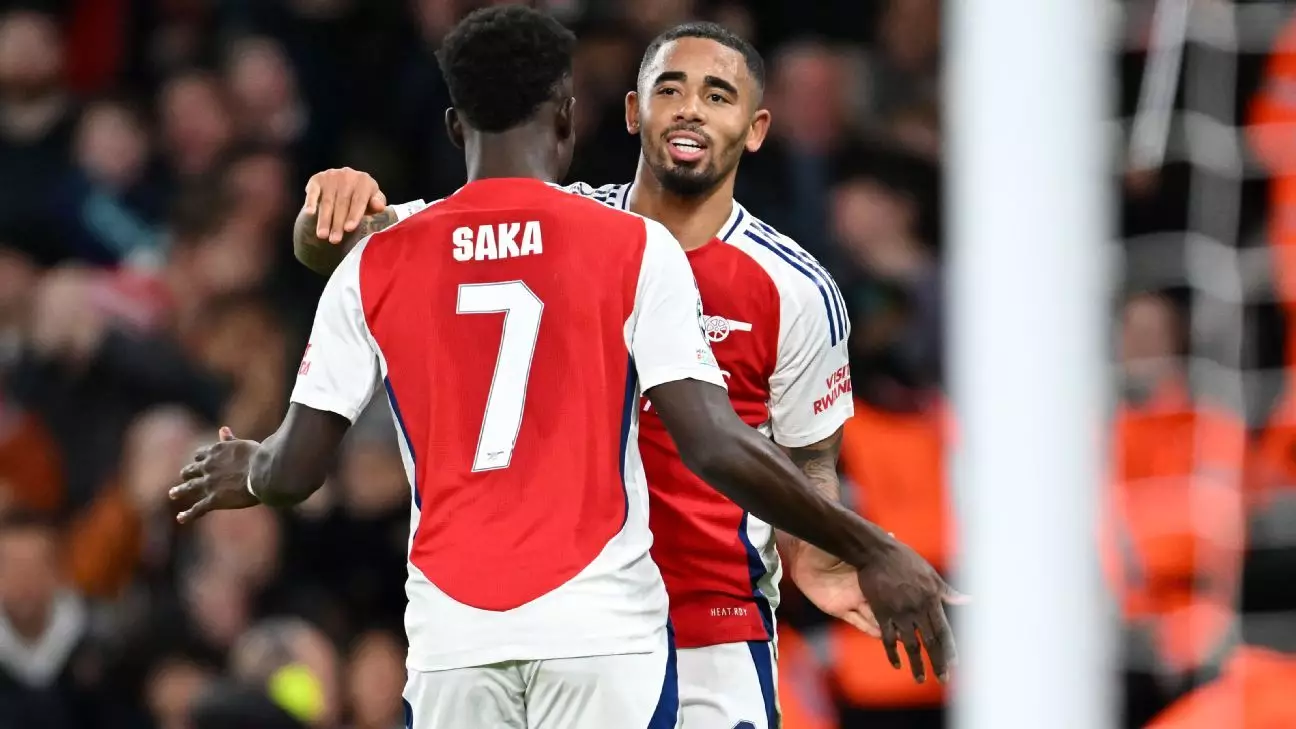In the summer of 2022, Arsenal’s ambitious signings of Gabriel Jesus and Oleksandr Zinchenko from Manchester City painted a picture of a club eager to mix experience with youth. These players brought not only exceptional talent but also a winning mentality, expected to guide the budding stars within the squad. However, as Arsenal cruised to a 3-0 victory over AS Monaco in their latest UEFA Champions League clash, it became increasingly clear that the narrative might be shifting. The Gunners looked poised to advance beyond the reliance on their marquee signings. This shift encapsulates both individual regression within the experienced duo and the emerging dominance of younger players who are stepping into the spotlight.
Lasting Impression of Bukayo Saka
The most striking testament to this evolution was Bukayo Saka’s standout performance. Scoring two crucial goals, Saka transformed what could have been a daunting encounter into a showcase of his developing prowess. His contributions, however, are not just a flash in the pan; they illustrate the maturity and talent that he has shown consistently at the highest level. Unlike the struggles of Jesus, who squandered several chances, Saka’s two goals highlighted his clinical nature and ability to seize opportunities. The 21-year-old forward’s remarkable form has seen him rack up significant numbers in goal involvements—only Mohamed Salah outpaced him among Premier League players this season. Such statistics not only reinforce Saka’s value to the team but also position him among Arsenal’s greats.
A Tough Night for the Veterans
Gabriel Jesus, for all his accolades, faced another disappointing evening. While he played a pivotal role in facilitating Saka’s first goal with a well-timed cross, his finishing was subpar. His inefficiency in front of goal has spiraled into a troubling trend, with a dismal tally of just one goal in 32 matches. Such struggles raise questions about whether the once-reliable striker can reclaim his form or if his presence is becoming a liability. Zinchenko, though absent due to injury, poses further concerns as his experience and tactical acumen would typically aid in such high-stakes games. Arsenal’s defense bore the brunt of his absence, showcasing a team still searching for stability.
Shifting Dynamics: New Faces in Big Matches
In a surprising move, manager Mikel Arteta opted to field Myles Lewis-Skelly, an 18-year-old substitute with just a handful of senior appearances, marking a significant moment in the club’s narrative. Being the youngest Arsenal player to start in the Champions League since Alex Oxlade-Chamberlain underscored the confidence Arteta is placing in youth. Lewis-Skelly’s mature performance only complicates the future for injured players like Zinchenko. His successful passes and intelligent gameplay not only demonstrated his potential but also represented a shift in the confidence Arteta has in young players, embracing new talent while perhaps offering a glimpse of a future where dependence on seasoned veterans may wane.
Despite the victory, Arsenal’s profligacy in front of goal was concerning. Players like Gabriel Martinelli and Martin Ødegaard missed opportunities that could have solidified the win even further. Arteta’s acknowledgment that the team should have finished the match with four or five goals exposes the ongoing struggle with decision-making in crucial moments. As the manager himself noted, the next step is to cultivate a mindset in which players can execute their decisions effectively, rather than being overly reliant on instruction from the sidelines.
As Arsenal sets its sights on strengthening their squad in upcoming transfer windows, the futures of both Jesus and Zinchenko spark discussion. Arteta has ruled out immediate transfers for Jesus, a nod to the club’s intention to maintain depth in their attacking options. However, with each passing match, the pressure mounts for the striker to perform and validate his spot in the starting XI. Similarly, Zinchenko’s potential exit could echo the club’s evolving philosophy—one that increasingly favors youth and vigor over merely seasoned tenacity.
In closing, Arsenal’s progression in the UEFA Champions League illustrates a transitionary phase, one where emerging talents like Bukayo Saka are beginning to redefine the club’s identity. The evolving dynamics highlight the pressing need for established players to reclaim their roles while facing the reality that the next generation is ready to take the reins. Amidst the challenges, there is palpable excitement for what the future holds as Arsenal continues to grow.

